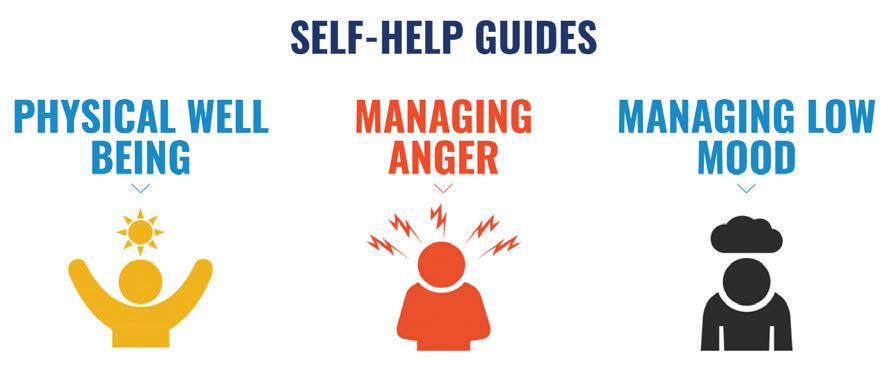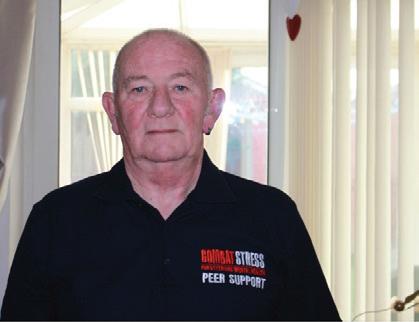
3 minute read
Looking after your mental wellbeing
For over a century, Combat Stress has helped former servicemen and women deal with mental health problems including anxiety, depression, and post-traumatic stress disorder (PTSD). Sue Freeth, Chief Executive of Combat Stress, introduces the service in Scotland.
A small but significant number of those leaving the Armed Forces develop mental health problems and struggle to leave the battlefield behind. Veterans wait on average 13 years after leaving the military before reaching out to Combat Stress. Without the right help their lives can become desperate, and for them, our support may be lifesaving. In Scotland, we operate out of our service hub Hollybush House in Ayr and have community teams in east, west and north of the country. We provide multi-disciplinary clinical services and peer support to veterans of all ages. Currently, 5-10 percent of veterans we support are over 65 years of age, but we could help more. We’ve joined Unforgotten Forces to work in partnership with like-minded organisations so we can provide the best possible service to older veterans across Scotland. During lockdown, the need for our specialist services has been critical. PTSD doesn’t just stop, and the anxiety and isolation brought on by the pandemic has been making life even harder for some veterans. While clinical staff have been unable to meet veterans in-person, we have been providing online and phone appointments, as well as offering access to peer support services online.
Advertisement
Are you, or is someone you know, struggling with mental health or wellbeing? Call the Combat Stress 24-hour helpline (0800 138 1619) for confidential advice and support. Mental health and wellbeing online
Combat Stress offers free online mental health and wellbeing self-care tools.
www.combatstress.org.uk/self-care-during-covid-19

Pete’s story
“I first joined the Army when I was 16, to get away from home. There were 10 kids in my family, it was horrible. “In 1975 I was deployed to Northern Ireland for an 18-month tour. It was a really difficult time. I ended up getting a compassionate discharge in 1977 over an incident that took place there.”
Without Combat Stress
I would be dead, or doing life in jail
Pete spent the next three years trying to settle into civilian life but found it tough. Not knowing anything else, he re-enlisted in May 1980 and spent the rest of his Army career in the Royal Corps of Transport, transporting men and equipment across Europe. Throughout this time, he battled with mental health issues without realising it. It wasn’t until he retired from the Army that things began to reach breaking point. “I think it was a combination of things that triggered it, but it definitely stemmed from that incident back in Northern Ireland. “I started to get angry at the slightest thing, even kids playing outside was like a red rag to a bull. The paranoia was just as bad. If I saw a conversation going on behind closed doors in the office, I was convinced people were talking about me; it became obsessive. “My family had to suffer through my mood swings, I was terrified about what I might do. “Then there was this one particular moment, talking to my mate about this guy who I really didn’t see eye to eye with, and well…all I’ll say is that the stuff I was saying drove him to tell me about Combat Stress.” For eight months the Combat Stress helpline number sat in his phone, but eventually, 11 years after leaving the Army, Pete made the call. “You don’t want to admit that there is a problem, but I knew it had got to the point where I was going to do something really stupid if I didn’t get help.” Pete was soon diagnosed with PTSD and underwent a range of treatment programmes including our six-week PTSD Intensive Treatment Programme and an anger management course. “It was a relief to know that there was actually something wrong with me, and that I wasn’t just a horrible b*****d. It was a difficult process, but it has changed my life. I still have moments, but I now have the tools to overcome them. “Quite simply, without Combat Stress I would be dead or doing life in jail…and I mean that.” Since turning to Combat Stress, Pete has rediscovered his drive and passion for life, with the days of moping around and feeling sorry for himself a thing of the past. When asked what he would say to other veterans out there struggling with their mental health, Pete was very blunt: “Make the call. You’re not going to get anywhere trying to do it on your own.”









